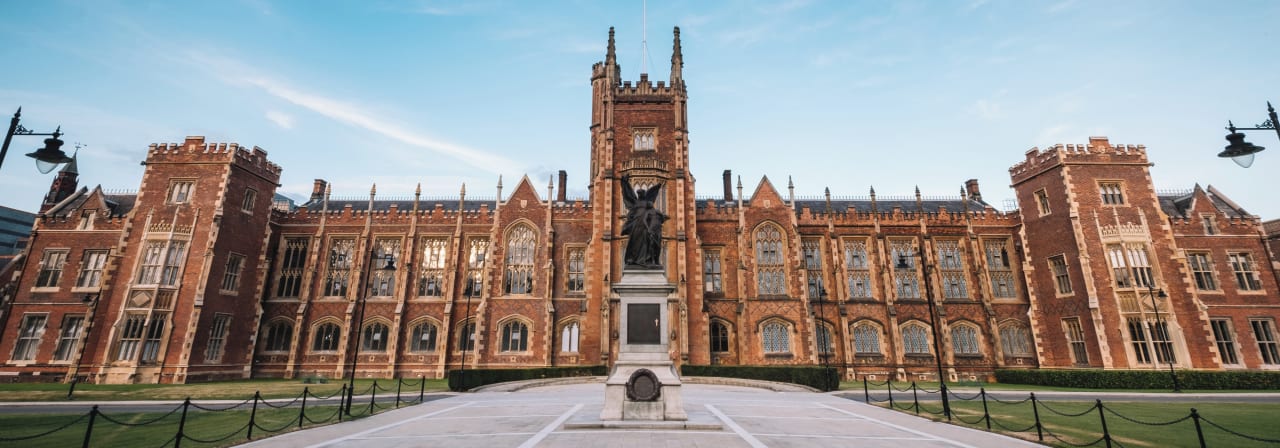
PhD Architecture
Queen's University Belfast

Key Information
Campus location
Belfast, United Kingdom
Languages
English
Study format
On-Campus
Duration
3 - 8 years
Pace
Full time, Part time
Tuition fees
GBP 23,850 **
Application deadline
Request info *
Earliest start date
Request info
* there is no standard closing date
** international fee
Introduction
Architecture at Queen’s addresses the issues of architecture and urbanism in an increasingly globalised world, where factors such as sustainability and climate change, identity and heritage, and notions of craft and form create a complex context that architecture has to mediate.
Architecture at Queen’s values both traditional academic and practice-based research. We have the expertise to support PhDs (full and part-time) involving deep investigations into cultural, historic and technological contexts both in Ireland and globally, and we offer a practice-based PhD (part-time) intended for those seeking to extend or redefine the boundaries and ambition of their current design practice. Our research-by-design activities surface new knowledge through not only the analysis of the existing, but also the documentation of new processes, behaviours and situations revealed through sophisticated design thinking. In both, architecture is seen both as a lens and as a measure of urban, suburban and rural landscapes.
Mode of study / duration
Registration is on a full-time or part-time basis, under the direction of a supervisory team appointed by the University. You will be expected to submit your PhD thesis at the end of three years of full-time or six years of part-time registration.
Subject Summary
Architecture at Queens is in the Top 200 in the World QS Rankings. In the island of Ireland we are the leaders in Architectural research and indeed we have world-class expertise in Architectural Design, Sustainable Cities, Heritage, and Architectural Humanities. Head of Architecture, Dr Sarah Lappin, was Chair of the Architectural Humanities Research Association for six years, and we were co-founders of the All-Ireland Architecture Research Group. You’ll conduct research that addresses the issues of architecture within an increasingly globalised world, focusing on an area of research strength such as materiality (developing new technologies); urbanism (sustainability and heritage); sustainability (developing urban resilience by adaptation); heritage (documenting the architectural past), and cultural context (gaining a real-time understanding of motion in the city). We value both traditional academic and practice-based research, particularly research-by-design, which we use to make new knowledge through not only the analysis of the existing, but also the documentation of new processes and situations created by new design thinking.
Architecture Highlights
Industry Links
- Architecture has collaborations with numerous universities and other organisations around the globe. These include: TU Delft; MIT; Tokyo Metropolitan Government; Green Building Council, Australia; Innovate UK; Northern Ireland Climate Change; Belfast City Council Sustainable Development Group; Todd Architects, Belfast; and Queen’s Film Theatre, Belfast.
World Class Facilities
- Architecture at Queen's boasts modern, state of the art design studios and review/exhibition spaces. In our brand new workshop, students can test ideas through laser cutting, model making and 3D printing.
Internationally Renowned Experts
- In the island of Ireland we are the leaders in Architectural research and indeed we have world-class expertise in Architectural Design, Sustainable Cities, Heritage, and Architectural Humanities.
Student Experience
- Working closely with their chosen supervisors, PhD students are also connected to the School of Natural and Built Environment’s research themes, benefitting from the cross-disciplinary context of research in the school.
Key Facts
As a Russell Group university and ranked in the UK top 10 (Guardian University Guide and Complete University Guides 2022), Queen’s is one of the best places in the UK to study architecture.
- In terms of research quality, Queen’s is ranked 12th in the UK for Architecture, Built Environment and Planning (REF 2021/Times Higher Education).
Admissions
Curriculum
Research Information
Associated Research
Architecture at Queen’s offers the opportunity to make an original contribution to the discipline of architecture through a PhD or MPhil within the department’s accomplished, academic environment. Each lecturer in architecture pursues a unique research interest so that as a whole, the school is a diverse and lively place to study.
Working closely with their chosen supervisors, PhD students are also connected to the School of Natural and Built Environment’s research clusters, benefitting from the cross-disciplinary context of research in the school. As part of the Russell Group, the university often hosts symposiums, seminars and conferences which connect researchers with renowned academics from across the globe.
Research Impact
Architecture has collaborations with numerous universities and other organisations around the globe. These include: TU Delft; MIT; Tokyo Metropolitan Government; Green Building Council, Australia; Innovate UK; Northern Ireland Climate Change; Belfast City Council Sustainable Development Group; Todd Architects, Belfast; and Queen’s Film Theatre, Belfast.
Course structure
You will carry out original research under the guidance of your supervisory team. There is no specific course content as such. This independent research is complemented by postgraduate skills training organised by Queen’s Graduate School, and other internal and external training courses organised through your supervisor.
You will normally register, in the first instance, as an ‘undifferentiated PhD student’ which means that you have satisfied staff that you are capable of undertaking a research degree. The decision as to whether you should undertake an MPhil or a PhD is delayed until you have completed ‘differentiation’.
Differentiation takes place about 9-12 months after registration for full time students and about 18-30 months for part time students: You are normally asked to submit work to a panel of up two academics and this is followed up with a formal meeting with the ‘Differentiation Panel’. The Panel then make a judgement about your capacity to continue with your study. Sometimes students are advised to revise their research objectives or to consider submitting their work for an MPhil qualification rather than a doctoral qualification.
To complete with a doctoral qualification you will be required to submit a thesis of no more than 80,000 words and you will be required to attend a viva voce [oral examination] with an external and internal examiner to defend your thesis.
A PhD programme runs for 3-4 years full-time or 6-8 years part-time. Students can apply for a writing up year should it be required.
The PhD is open to both full and part time candidates and is often a useful preparation for a career within academia or consultancy.
Full time students are often attracted to research degree programmes because they offer an opportunity to pursue in some depth an area of academic interest.
The part time route is a suitable option for those unable to study for a PhD full time. This may be due to family commitments or those already in employment. On the former, studying part time for a PhD can be very accommodating in juggling different responsibilities. On the latter, part time candidates often choose to research an area that is related to their professional responsibilities.
If you meet the Entry Requirements, the next step is to check whether we can supervise research in your chosen area. We only take students to whom we can offer expert research supervision from one of our academic staff. Therefore, your research question needs to engage with the research interests of one of our staff.
Program Outcome
A research degree offers students an opportunity to foster their capacity for independent research and critical thought. It also allows students to explore an area of interest and so understand and solve theoretical and practical problems within the field.
Undertaking a research degree also enhances a student’s written and oral communication skills, and a PhD is almost always a formal requirement for an academic post.
Program Tuition Fee
Career Opportunities
The School has a proven track-record of placing its PhD graduates in tenure-track research and teaching posts at top universities in the UK and elsewhere.
English Language Requirements
Certify your English proficiency with the Duolingo English Test! The DET is a convenient, fast, and affordable online English test accepted by over 4,000 universities (like this one) around the world.